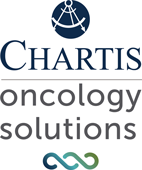


This project will be conducted by the Academy of Oncology Nurse & Patient Navigators (AONN+) in collaboration with Chartis Oncology Solutions and the American Cancer Society.
Study Overview
The purpose of this multisite exploratory quality study is to (1) assess the reliability and validity of 10 key metrics selected from the list of 35 developed by AONN+, and (2) gain insight into the barriers and challenges navigation programs encounter during the implementation of navigation metrics. Harnessing the power of this information to create best practices will elevate navigation and garner industry support for advancing patient-centered care delivery. This research project is a vital, transforming event in the industry, with the desired outcome of providing validated measures to demonstrate the impact of oncology navigation on quality cancer care delivery, return on investment, patient experience, and program sustainability. To measure, and, subsequently, improve the quality of cancer care, navigation programs must use standardized metrics, focusing on evidence-based practice.
Study Opening Date
March 2018
Study Goals
- To gain insight and understanding into the barriers and challenges navigation programs encounter during the implementation of navigation metrics
- To evaluate the validity and readability of the 10 selected navigation metrics
Study Inclusion Criteria
- Current AONN+ members
- Participants’ analytic cases are 750 cases or greater
- Participants with a minimum of 2 navigators within the selected study site
- Institution or physician practice administrative support
- Current and active participation in national accreditation programs. Examples include Commission on Cancer ± National Accreditation Program for Breast Centers, Quality Oncology Practice Initiative, Merit‑Based Incentive Payment System, and Oncology Care Model
Don’t miss the opportunity to have your institution join this groundbreaking study!
Submit the Letter of Intent
Letter of IntentAONN+ Standardized Evidence-Based Metrics to Be Collected
| Domain | Metric |
|---|---|
| Care Coordination/Care Transition | Barriers to care; measuring the number and list of specific barriers to care identified by navigator per month |
| Care Coordination/Care Transition | Diagnosis to initial treatment; measuring the number of business days from diagnosis (date pathology resulted) to initial treatment modality (date of 1st treatment) |
| Operations Management/Organizational Development/Health Economics | Navigation caseload; measuring number of new cases, open cases, and closed cases navigated per month |
| Operations Management/Organizational Development/Health Economics | Measuring the number of navigated patients readmitted to the hospital at 30, 60, and 90 days |
| Psychosocial Support Services/Assessment | Psychosocial distress screening; measuring the number of navigated patients per month who received psychosocial distress screening at a pivotal medical visit using the National Comprehensive Cancer Network distress screening tool |
| Psychosocial Support Services/Assessment | Social support referrals; measuring number of navigated patients referred to support network per month |
| Survivorship/End of Life | Palliative care referral; measuring number of navigated patients per month referred for palliative care |
| Patient Advocacy/Patient Empowerment | Identify learning style preference; measuring the number of navigated patients per month whose preferred learning style was discussed during the intake process. The group agreed this should be included if we can identify a validated tool |
| Professional Roles and Responsibilities | Navigation knowledge at time of orientation; measuring percentage of new hires who have completed institutionally developed navigator core competencies |
| Research/Quality/Performance Improvement | Patient experience/patient satisfaction with care; measuring patient experience or patient satisfaction survey results per month. The group determined use of CCHAPS (Community-wide Children’s Health Assessment & Planning Survey) for measuring patient satisfaction |
Qualitative Data
- Preassessment and postassessment to evaluate each study site’s baseline knowledge about navigation metrics, data collection, and analytics
- Study site challenges and barriers with metrics implementation and data collection
- When a challenge/barrier is identified, how the challenge/barrier can be overcome (a mini PDSA cycle)
- Capture performance improvement enhancements during study period and identify best practices
Quantitative Data
- NAVmetrics™, a cloud-based tool powered by Chartis Oncology Solutions’ ONC iQ® business intelligence product for data capture, management, and reporting of navigation metrics implemented at each study site to collect the 10 navigation metrics
Desired Outcomes
Primary Objectives
- Implementation and validation of metrics
- Establishing evidence-based, national standardized navigation benchmarks
- Navigation research to validate sustainability and value of navigation
- Identification of navigation outcome measurement best practices and lessons learned
- Creation of a centralized navigation metrics database and repository
Secondary Objectives
- Identify clinical and IT challenges and barriers with navigation metrics implementation
- Identify common barriers and challenges (both individual and system level) to metric measurement and strategies for overcoming those
- In collaboration with the American Cancer Society develop a Navigation Metrics Implementation Toolkit as an outcome of the study findings
Contact
For questions regarding this study, please e-mail















